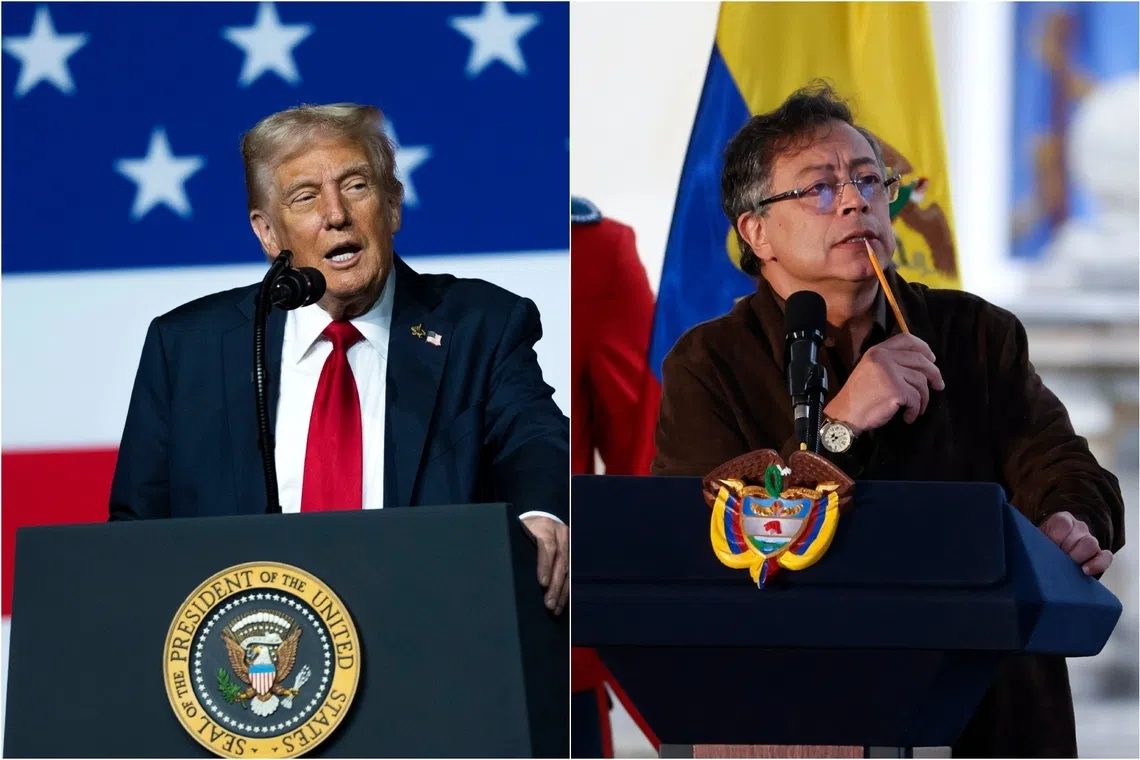US says it hit Colombian rebel vessel as Colombia condemns Trump’s accusations against Petro
Sign up now: Get ST's newsletters delivered to your inbox

US President Donald Trump called Colombian President Gustavo Petro an “illegal drug leader” on Oct 19.
PHOTOS: DOUG MILLS/NYTIMES, EPA
Follow topic:
COLOMBIA - US President Donald Trump called Colombian President Gustavo Petro an “illegal drug leader”
Mr Trump’s comments marked a new low in relations between Bogota and Washington, which have frayed since Mr Trump returned to office in January and since his administration launched a series of strikes on vessels allegedly transporting drugs in the Caribbean.
The US President said on social media that the US would stop large-scale payments and subsidies to Colombia. Republican Senator Lindsey Graham, a close ally, said Mr Trump will soon announce “major tariffs” on the country.
Colombia currently pays tariffs of 10 per cent on most exports to the US, a baseline level Mr Trump has imposed on many countries.
Mr Hegseth wrote on social media platform X that the Pentagon had destroyed a vessel and killed three people on Oct 17 “in the USSouthcom (US Southern Command) area of responsibility”, which includes the Caribbean.
He said the ship was affiliated with the leftist rebel group National Liberation Army and was involved in illicit narcotics smuggling, without offering evidence to back the claim. The Pentagon said it had nothing to add beyond Mr Hegseth’s initial post.
Colombia condemns Trump’s remarks
Mr Trump wrote on his Truth Social platform: “President Gustavo Petro, of Colombia, is an illegal drug leader strongly encouraging the massive production of drugs, in big and small fields, all over Colombia.
“The purpose of this drug production is the sale of massive amounts of product into the United States, causing death, destruction and havoc.”
Reuters could not immediately establish which payments Mr Trump was referring to.
Colombia was once among the largest recipients of US aid in the Western Hemisphere, but the flow of money was suddenly curtailed in 2025 by the shuttering of USAid, the US government’s humanitarian assistance arm.
Colombia’s Foreign Ministry condemned Mr Trump’s remarks as offensive and a direct threat to its sovereignty, and vowed to seek international support in defence of Mr Petro and the country’s autonomy.
“These accusations represent an extremely serious act and undermine the dignity of the President of Colombians,” it said in a statement.
The US State Department referred questions to the White House, which did not immediately respond to a query.
Fraught relations
In September, the US revoked Mr Petro’s visa after he joined a pro-Palestinian demonstration in New York and urged US soldiers to disobey Mr Trump’s orders.
The US administration’s deadly strikes on boats in the Caribbean have also outraged Colombians.
Many legal experts and human rights activists have condemned the extraordinary series of military actions, with Amnesty International describing it as murder on the high seas.
Earlier in October, Mr Petro said one of the strikes hit a Colombian vessel, an allegation the Trump administration denied.
Mr Petro condemned the most recent bombing, saying the boat belonged to a “humble family”, not the National Liberation Army. He also hit back at Mr Trump’s remarks.
“Mr Trump, Colombia has never been rude to the United States... but you are rude and ignorant to Colombia,” Mr Petro responded on X. “Since I am not a businessman, I am even less a drug trafficker. There is no greed in my heart.”
Colombia is fighting its own longstanding drug problems.
In 2024, Mr Petro pledged to tame coca-growing regions in the country with massive social and military intervention, but the strategy has brought little success.
In September, Mr Trump designated countries such as Afghanistan, Bolivia, Burma, Colombia and Venezuela among those the US believes to have “failed demonstrably” in upholding counter-narcotics agreements during the past year. REUTERS

